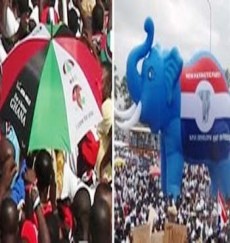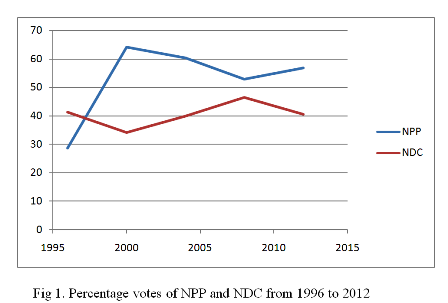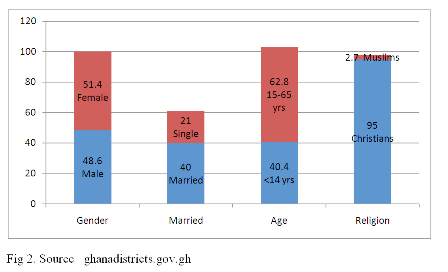 One will now be thinking that NDC is done and dusted in the Berekum constituency having suffered another bruising defeat in the hands of their arch nemesis, the NPP. I believe they should not throw in the towel yet but to go back to their drawing boards to critically review and evaluate their approach to elections in the constituency and assess how they believe the people of Berekum think of them.
One will now be thinking that NDC is done and dusted in the Berekum constituency having suffered another bruising defeat in the hands of their arch nemesis, the NPP. I believe they should not throw in the towel yet but to go back to their drawing boards to critically review and evaluate their approach to elections in the constituency and assess how they believe the people of Berekum think of them.
There is a tendency for one to start believing that the municipality (East and West) has become a stronghold for the NPP, and actually such an individual to some extent cannot be faulted, after the NDC, having lost 4 consecutive times, both presidential and parliamentary elections to the NPP. The local politics in Berekum is still in its infantile stages to make a strong claim of the fortunes to always skew to the side of the NPP. After all the NDC had some spell in 1992, 1996 when Ghana entered into democratic rule and if one wants to score points like in a football game it is going to be 4-2 . Such a score does not make an ongoing game decisive; the foe always has enough time to hit back. In this piece I will be putting a magnifying lens on some issues I believe contributed to and if not addressed will continue to contribute to the future woes of the NDC:
- 1.Elections trend since 1996 and what it can reveal about future elections
- 2.Demography and its implication for the party
- 3.Party legislators and their role in helping the party clinch victory in the next election
- 4.Adapting Campaign strategies to the current needs of the ‘real’ people
- 5.Strengthening party cohesion
Elections Trend since 1996
NDC won the 1996 elections 41.30% against a 28.70% for the NPP. A lot of factors can be said to have contributed to their victory. The advantage of incumbency cannot be ruled out in addition to the many tangible developmental projects that had been undertaken by J.H. Owusu Acheampong. It can be argued that Berekum saw most of it changes in terms of street lights, roads, clean water, and sanitation ex cetera during his era. I believe somewhere along the line complacency set in after having put two victories in the bag. A price was paid when the NPP chalked a landslide victory which sent shock waves in the camp of the NDC, a 64.20% against 34.20% in 2000. It is very difficult to fathom the lost of the NDC but in reality it could be seen coming. Were the people fed up with the NDC such that they just needed a change?; Was most of the promises made previously not fulfilled? Was the party not appealing to the new demography of the constituency? It will be a bit dangerous to try to single out a factor from above as the cause but a mixture of all with different degree of effects. From the graph below it can be seen that, the party was gaining weight and seemed to be catching up after 2000 partly because they began to put their house in order, their message was settling down well with the people, or the people could not see the many promises of the NPP materialising. This became more evident when NDC came their closest in 2008 by polling 21,898 compared to 24,915 for the NPP. In fact I believe the NDC had a good chance to win because of the following factors: 1) the NPP had a very new candidate compared to Lord Oppong who was already in the system 2) The NPP had not done any significant developments to deserve another chance 3) The NPP nationally had become unpopular. The lack of imagination in contrast to the dynamism of the NPP helped the NPP scrape another victory. There is something striking about the graph below. It can be seen that the graph is diverging again and there are three hypotheses that can be made about how it will look like in 2016. 1) Continuous divergence 2) Convergence or 3)Close to convergence. It is up to the NDC to work towards which results they want to see produced in 2016.
Demography and its implications
The distribution of the population in terms of age, gender, work, education etc can help parties in targeting voters during elections and even in planning for the constituency. The knowledge of these data can help focus resources and intensity of campaign in a particular direction. Example, the knowledge of the municipality consisting of 51.4% females as against 48.6% can enable the party think through their message in terms of how it can empower and address the issues of the average woman. In Berekum this can be about business, education and domestic violence. Based on a recent conversation with the 2012 NDC’s elections director for the Berekum east constituency, it was quite clear that there was no clear strategy in terms of targeting voters based on the demography. Fisher, Cutts & Fieldhouse (2010) assert that parties that fail to target their resources effectively are less likely to demonstrate positive electoral pay offs overall. A message about developing the market place, putting measures in place to ensure increased enrolment of the girl child in school and making sure domestic violence is reduced drastically will arguably go down well with the women populace. The graph below also shows how the constituency is distributed in terms of marriage, age, and religion. Another important parameter that could be followed is the type of work, the percentage of adults in work and how they can be helped if working to maximised their incomes and to secure job if unemployed. One may argue that all the above proposed strategies involve money and resources which obviously are not very easy to come by. I believe financial stability may be a major driving factor but our people are also quite discerning to recognise non-monetary efforts made by individuals to help alleviate their poverty state. This can take the form of one to one meetings with individuals, Town hall meetings with constituency and organising workshops to equip individuals to becoming entrepreneurs amongst many other strategies. It appears the party in 2012 got a little bit carried away into thinking they would win by riding on the back on the national campaign. The National Democratic Institute for international affairs (NDI) (2008) observed that politicians who are in touch with the grass root people are the ones the voters remember at election time.
Legislators and their role
NDI (2008) states that citizens expect to have a contact with the elected representative and recognise them as someone who can solve the problem and help him/her navigate the complex government bureaucracy. It was a bit of a shock when Owusu Acheampong lost to Nkrabea Effah Dartey in 2000 considering amount of developmental project he undertook. I strongly believe that unlike the previous years he had grown out of touch with the local people and gotten to a point of believing it was a ‘lock-in’ that he was going to win. The interesting aspect of politics is the citizen’s ability to hold elected representatives accountable through the ballot box. One area the NPP can again be said to outwit the NDC is their ability to seize the right moment to make changes. Effah Dartey would have lost the 2008 elections had he stood again but NPP were very quick to change him at the preliminary stages to avert any defeat. In hindsight if the NDC had done the same in 2000 or even in 2012 they could have at least salvaged one of the seats.
It had become clear from debates on different media platforms during the build up to the elections 2012 that the MCE, Lord Oppong, was despised by many because of his mismanagement of the municipality’s resources and his incompetence to execute different projects promised. It was evident and recurrent from the submissions of different callers on popular stations like Shalom and Chris that he had bad communication skills, heeds to no advice, unfriendly and was partial in many respects. It would appear to me that any party that is very serious to clinch victory would have used an individual who had fewer blemishes. The graph is fig 1 can still provide some insight to what happened in 2008 and 2012. The little I got to know about the aspirant Lord Oppong around 2004 was a very humble secondary school teacher who was in touch with the grass root people and was more abreast with the issues bothering the average ‘Joe’. It is such a shame that when luck finally found him, he succumbed to be moulded into the caricature figures of politicians we have always known.
It was not surprising from the results in 2012 that even Attah Boateng who was very new to the political scene though having lost the Berekum east seat did better than him (41.22% against 40.01%). It can be said he, Attah Boateng, may have suffered some of the wrath of the people directed to the then MCE. I believed among the 2 constituencies the East looked more like a neutral ground which could have gone either way. NDI (2008) further states that throughout the world citizens tend to identify with legislators in more way personal ways than they do other public figures. It can be inferred from the latter statement that if voters feel aggrieved by a particular political party their anger is directed to the elected MP or MCE and this can have repercussive effect for the party nationally. It is no surprise that the NDC has been losing both presidential and parliamentary elections since 2000.
Campaign strategies
Every political party must have strategies to boost their votes and reduce the opponents votes (Fisher et al, 2010). Having suffered 4 consecutive defeats, one would think the NDC would have a very thorough and potent plan to take at least a seat from the 2 newly created constituencies. From information gathered there appeared to be some efforts made but was too far from a victory clincher. It seemed both aspirants for the NDC were leading the campaign instead of the party leading the campaign. The danger of this is that most decisions become subjective as aspirant feel they are running the show. Most times these sorts of attitudes can be suicidal. Campaigning devices it appears were not utilised properly. It could be noted the party was reliant on radio campaigning than going house to house to talk to the ‘real’ voter. One can argue that a lot of house to house campaign was done but I would prefer to call that a house to house showcasing of candidate. The advantage of the house-to-house strategy is that it gives a more human face to the aspirant. Eventhough e-campaigning has become popular overtime; it cannot substitute the benefits traditional method of house to house campaigning.
It could also be observed that no effort was made to brand the aspirants. It was always going to be difficult to brand Attah Boateng who was hardly known in the constituency and Lord Oppong Stepehen who was unpopular for many reasons. The questions the NDC should have critically been deliberating on were how to make this fairly new candidate appealing to the average voter. It was said in some factions that he was chosen because most of the NPP in the constituency were immigrants and Attah being an immigrant himself will appeal to them. It cannot be ruled out that intrinsic ethnicity bias will most at times play a factor in determining how a candidate appeal to the populace but again there is not enough evidence to prove that the majority of the NPP are immigrants.
Also it could be observed that most of the campaign messages were not realistic and achievable. One thing political parties should be aware is the fact that voters cannot easily be taken for granted in this time and age. Due to scarcity of resources and therefore the competition for resources voters will only buy into promises which are achievable. Looking at the above demography one would think the campaign message should be targeting the youth and the working age groups but it has become quite clear that the NDC which was a champion in empowering the youth in the municipality has now become unattractive to the youth.
Party cohesion
It cannot be discounted that there are some underlining internal rivalries that are crashing the party under its own weight. There were rumours before the elections that Lord Oppong and Attah Boateng were at loggerheads over different issues. Again it can be noted that one area that the NPP are generally good compared to the NDC is putting their house in order and not hanging their dirty linen in the public.
A lot has been said about tensions between different executives during the build up and even after the election. I believe each individual is there as a check for the other and therefore each should accept constructive criticisms in good fate. Party cohesion is central to the party making any meaningful comeback.
‘A house divided against itself will not stand’
References
J. Fisher, D. Cutts and E. Fieldhouse (2010): Constituency Campaigning in the 2010 British General Elections. Uxbridge
Nations Democracy Institute for international affairs (2008)
http://berekum.ghanadistricts.gov.gh



